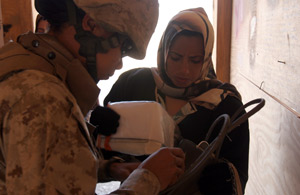Despite the presence of insurgents throughout the country, Iraqi soldiers are hopeful their training will help rebuild a peaceful Iraq. With assistance from coalition forces the growing Iraqi Army continues to recruit and train men.
The army was developed under the Iraq Ministry of Defense after the 400,000-man army of ousted dictator Saddam Hussein was disbanded. The army is nearly 100,000 troops-strong, but the goal is to have 135,000 properly trained soldiers.
The East Fallujah Iraqi Camp, a location originally set up for operations during Operation Al Fajr, is the site of a new class of recruits ready to take on the challenge to become Iraqi soldiers.
“We were hoping to get 700 [recruits] in here, but when they found out they were going to the Al Anbar province only 420 got on the buses,” said Col. Mike Lentz, EFIC camp commandant.
The main recruiting stations are located in Baghdad, Basra and Mosul. According to Multi-National Force--Iraq, the men range between ages 18-35 and were recruited from Al Anbar province via advertisements and word of mouth. Upon completion of training the soldiers must serve their country for two years.
Until now, training was conducted at one of two Iraqi Military training bases –Kirkush or An Numaniyah, however the growing need for soldiers called for other training grounds.
“The Kirkush military training instructors are very professional and very thorough,” said Lt. Col. Scott Lystad, Ministry of Defense Coordinator, Iraqi Security Forces Directorate. “They have high standards. They’re strict on the recruits, and the recruits seem to respond to it very well.”
Kirkush instructors are known to be self-sufficient, however, coalition forces comprised of Marines and Soldiers will advise them.
The training is condensed into a four-week course. Normally soldiers undergo a standard eight-week basic training program that includes basic soldiering skills, weapons marksmanship, individual tactics, physical training, soldier discipline and drill and ceremony. Later they enroll in advanced courses in infantry tactics, heavy weapons, land navigation and other operational training both before and after joining units in the field.
“It’s a little more advanced than what we would be teaching at a regular course because of the current conflict,” said Army Staff Sgt. Travis Case, military advisor, Advisory Support Team. “We want to give them as much information as we can in a short period to get ready.”
Army cadre such as Case train Iraqi soldiers in high volumes anywhere from 500 to 1,000. Although the regular training bases have better training resources than what is available here instructors make do with what they have because of the current demand to fill immediate requirements.
“They want to become part of something,” said Case, referring to the Iraqi soldiers. “They’ll endure throughout the whole course on a promise that they’re going to do something for their country.”
The ultimate goal for coalition forces is to turn the Iraqi recruits into effective combatants. Instilling in the recruits self-sustaining discipline that will endure after their training is complete will take strong officer and noncommissioned officer leadership to enforce it. To better train recruits, coalition forces recruited soldiers who served under the old regime. Such officers and NCOs proved to be invaluable to the mission as they provided input and advice.
“In the old army, all they knew was suffering,” said Hussin. “There is a big difference between the old and new, and we try to do everything we can for these soldiers so that together we can build a new army and a new Iraq.”
Although there are several differences in military eras, one noticeable difference is the amount of respect within the soldiers. Members of tribes and sects are treated equally. Notable differences in training between U.S. forces and former training under Saddam’s regime include schooling in human rights, the laws of land warfare and tolerance in a multi-ethnic team.
“There is a big difference in armies,” said Iraqi Army training instructor, 1st Lt. Bashar, who’s been a soldier for 12 years. “We cannot even compare it. Here we provide our soldiers with everything they need.”
The army’s performance is crucial to plans to draw down the number of U.S. troops in the country. Iraqi Army officials still find the need for coalition force presence.
“The coalition forces work with us together and help us to build a new Iraq,” said Hussin. “Every country hopes to be left alone without anyone to help them. Us…not yet, not Iraq. We need them here. We cannot handle everything. We need support from any country willing to help Iraq.”
“We have nearly 450 soldiers to make good Iraqi Army to finish terrorists,” said Bashar. “God willing, we will do anything for Iraq. God willing, all of us can work together under coalition forces to make good soldiers to fight for our future.”
Hashem admits he has not seen much improvement in Iraq, but he is confident they will be able to put out quality soldiers in the city and the army will eventually defeat terrorism in their country.
“God willing that will not be a problem for long,” said Bashar, referring to the terrorists. “And if there is, every problem has a solution. We will find the solution and finish it.”
Confident in their training, the two Iraqi instructors are proud to don their uniforms, although fear for their lives.
“There are too many terrorists out there, but we don’t care,” said Hussin. “It is our duty and we have to work on that. This is my country. If I don’t fight for it no one will.”
